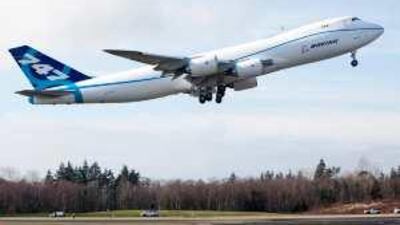The giant US aerospace company Boeing expects the UAE to become its fourth most important market in the world for commercial aeroplanes over the next two decades, a top company official says. That would leave it only behind the US, China and Germany. In a nod to the ambitious growth plans of the UAE's four national airlines, the plane maker expects carriers here to receive up to 45 per cent of the region's aircraft deliveries, which could mean up to 770 aircraft worth US$135 billion (Dh495bn) at list prices by 2028, its latest market outlook shows.
The expectations match those of its defence division, Boeing Defence, Space and Security, which recently also forecast the UAE Armed Forces would become one of its top five international customers. "Although the UAE doesn't appear on the top 20 global economies, [the growth is due to] the fundamental strength of its carriers with business models built around carrying connecting traffic through Europe and Asia via the Middle East," said Randy Tinseth, the vice president of marketing at Boeing Commercial Airplanes.
While connecting Asia to Europe will account for major deliveries to long-haul specialists Emirates Airline and Etihad Airways, Mr Tinseth said the UAE's budget airlines Air Arabia and flydubai would also grow, with the regional budget travel market expected to expand by 400 per cent. The shift comes as the UAE and other Gulf countries seek to make air travel a major export after oil and gas by capitalising on its location and the resilience of Middle East economies.
Over the past five years, Etihad has increased its seating capacity by 47 per cent a year, while over the past 10 years Emirates has grown by 17 per cent and Qatar Airways by 24 per cent annually, Mr Tinseth said. The rise of these airlines will have a major effect on the global airline industry, with some carriers in Europe and Asia losing market share. Regional airlines carry 16 per cent of traffic between Asia and Europe via the Middle East, he said.
"If you take a look at the plans and orders that airlines have on the books, they will grow this market share to 22 per cent by 2020," Mr Tinseth said. "So they are going to take market share at someone's expense - more than likely at either end of that equation." Boeing is aiming to gain ground against arch-rival Airbus this decade as it unveils two new aircraft this year: the 787 Dreamliner and the 747-8, its latest jumbo jet.
"We are making great progress in the 787 and the 747 and those are still on track both to complete certification and deliveries," Mr Tinseth said. Boeing planes make up 60 per cent of fleets in the Middle East, but has slipped below Airbus for deliveries over the past five years, with a 42 per cent market share. "We have lost market share in the region," Mr Tinseth said. "But we have employed a lot of resources and put in very strong effort and energy towards turning around our performance."
Boeing's 42 Middle East customers played a major role in helping it weather the recent global downturn better than it did the crisis that followed September 11, when it was forced to lay off staff in significant numbers. "The number one thing was [our Middle East customers'] ability to take wide-bodied aircraft during the downturn," Mr Tinseth said. He estimated the region's carriers took delivery of 90 such aircraft over the past 24 months, including the 777, Boeing's highest revenue earning plane.
But Mr Tinseth declined to answer one of the biggest questions in aviation right now: whether Boeing's two new aircraft would make their debut at the Farnborough Air Show in England this summer. @Email:igale@thenational.ae

